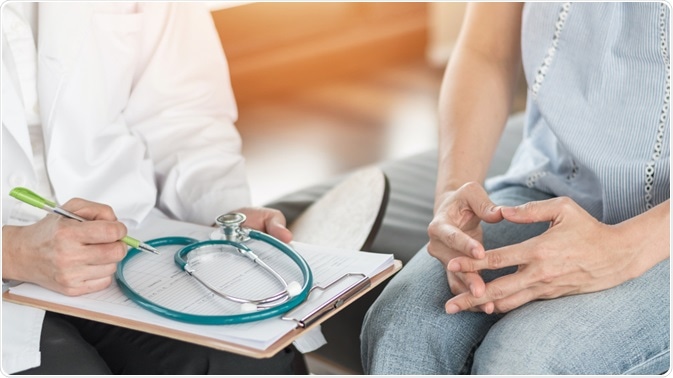A labiaplasty is a surgical procedure performed chiefly for aesthetic reasons. Following a labiaplasty, there is no standard of care since different clinics and spas have their own regimens.
 Image Credit: Chinnapong/Shutterstock.com
Image Credit: Chinnapong/Shutterstock.com
Anti-infective measures
Most clinics offer some type of antibiotic therapy to prevent infection. It may be topically applied, such as erythromycin, orally administered such as with first-generation cephalosporins, or a combination of topical and oral antibiotics. Topical antibiotics should be reapplied after each perineal or vulval wash. The application of soap to the vulva should be avoided during this period.
Antibiotics are usually prescribed for 5 days following the surgery after which the wound is usually epithelialized. However, some surgeons will advise application for 10 days. The occurrence of superficial infection during this time increases the risk of wound dehiscence, suture granulomas, and scarring.
In most cases, the patients are advised to avoid soaks in bathtubs and swimming and opt to have short showers instead. The vulva is to be patted clean and dry very gently and careful daily dressing with clean dressings along with warm water rinses are recommended. Rinsing should occur after each toilet visit. Dry clean dressings should be reapplied regularly for at least 5 days or until the wound becomes dry.
Sitz baths are also useful during this time to remove dead skin, relieve pain and reduce inflammation in the affected area.
To promote timely healing, minimize scarring, and prevent infection, patients are advised to avoid sexual intercourse for at least 6-8 weeks following the surgery.
Pain control
Pain is usually present after labiaplasty, and anti-inflammatory drugs are commonly prescribed, when appropriate. The application of ice packs is also useful in reducing pain, swelling and inflammation. Other than a sterile dressing pad, only loose underclothing should be worn for a month after the procedure to avoid friction.
Other self-care advice
Following the surgery, most patients remain at the clinic for one day for observation and pain relief. If indicated, measures are taken to prevent thromboembolism. Rest is important to optimize circulation to the operative site. If the patient sits up, this will put pressure directly on the wound, so it is advised to lie on the back instead.
The patient should be advised to rest and take leave from ordinary work for at least a week to allow healing to begin properly.
While walking briefly every few hours helps to ward off postoperative blood clots in the veins, walking too long, sitting and working vigorously are all to be avoided for at least a month following the procedure to minimize strain on the operative site and to promote adhesion of the epithelial flaps. Straining, lifting heavy weights, or running, may put pressure on the perineum and cause wound breakdown. Driving should be resumed only after the pain is so mild as not to require any medication for its control. It is also recommended to avoid sitting astride objects, as in cycling or riding a horse.
Smoking and illegal substances often slow healing, and these should not be used for at least 8 weeks.
A mild fever may be present and should be managed with an antipyretic medication such as acetaminophen.
To avoid constipation which may cause pain in the wound area, a high-fiber diet is advised, with lots of fruit and fresh vegetables as well as plenty of water.
What to watch for
Complications following a labiaplasty may include:
- Wound dehiscence where the flaps do not unite properly
- Hematoma formation due to incomplete hemostasis
- Flap necrosis or death of tissue near the edges of the flap, which is most common following wedge resection, and is caused by failure of vascular supply to the remaining labial flap following excision of the wedge
- Chronic pain due to neurovascular interference
- Dyspareunia
- Visible scarring and scalloping of the labial edge due to contracture of the fibers in the skin at right angles to the labial edges
- Superficial infections
- Under-resection leading to persistence of ‘too large’ labia
- Overzealous resection leading to the absence of labia in the most severe cases, or minimal labial tissue, with or without clitoral hood overhang
- Fistula formation
- Need for revision surgery to correct the labial appearance
If there is pronounced swelling or bleeding, pain or fever which does not respond to medication, or increasing wound discharge, the patient should contact the doctor at once. If any medication produces signs of an allergic reaction or if there is a sense of weakness or numbness in the lower extremities, a physician should be contacted immediately.
References
Further Reading
Last Updated: Feb 21, 2023